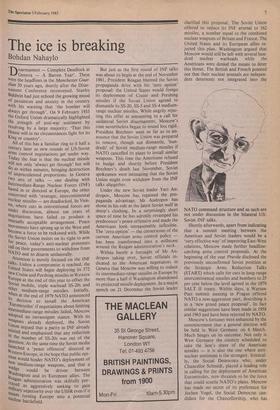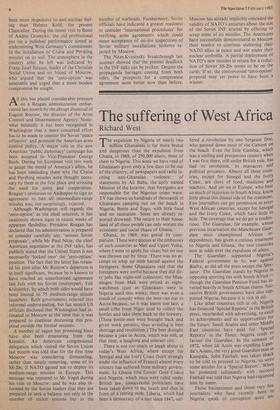The ice is breaking
Bohdan Nahaylo 'Disarmament — Complete Deadlock at Geneva — A Barren Year'. These were the headlines in the Manchester Guar- dian 50 years ago, shortly after the Disar- nament Conference reconvened. Stanley Baldwin had just echoed the growing mood df pessimism and anxiety in the country with his warning that 'the bomber will always get through'. On 9 February 1933 the Oxford Union dramatically highlighted the _strength of anti-war sentiment by resolving by a large majority: `That this House will in no circumstances fight for its King or country'. All of this has a familiar ring to it half a century later as new rounds of US-Soviet arms control negotiations get under way. Today the fear is that the nuclear missile will not only `always get through' but will do so within minutes, bringing destruction of unprecedented proportions. In Geneva two sets of talks — one dealing with Intermediate-Range Nuclear Forces (INF) based in or directed at Europe, the other concerned with 'strategic, intercontinental nuclear missiles — are deadlocked. In Vien- na, where cuts in conventional forces are under discussion, almost ten years of negotiations have failed to produce a Mutually acceptable arrangement. Peace Movements have sprung up in the West and become a force to be reckoned with. While the Soviet Union insists on its right to arm for peace, today's anti-nuclear protesters Call on their governments to withdraw from NATO and to disarm unilaterally.
Attention is mostly focused on the INF talks. Unless a compromise is reached, the United States will begin deploying its 572
new Cruise and Pershing missiles in Western Europe
at the end of this year to offset the
Soviet mobile, triple warhead SS-20s and Other medium-range missiles. Initially, When at the end of 1979 NATO announced Its decision to install the American `Euromissiles if negotiations about limiting intermediate -range missiles failed, Moscow adopted an intransigent stance. With its vy,,eaPons already deployed, the Soviet 'Ilion argued that a parity in INF already e. xisted and emphasised that any reduction tn the number of SS-20s was out of the uestion. At the same time the Soviet media _launched a 'peace offensive' directed at Western Europe, in the hope that public opi- nion would hinder NATO's deployment of new medium-range weapons: and that a wedge would be driven between washington and its European allies. The a eagan administration was skilfully por- trayed as aggressively seeking to gain
nary superiority over the USSR even if it meant turning Europe into a potential nuclear battlefield. But just as the first round of INF talks was about to begin at the end of November 1981, President Reagan blunted the Soviet propaganda drive with his 'zero option' proposal: the United States would forego its deployment of Cruise and Pershing missiles if the Soviet Union agreed to dismantle its SS-20, SS-5 and SS-4 medium- range nuclear missiles. While angrily rejec- ting this offer as amounting to a call for unilateral Soviet disarmament, Moscow's tone nevertheless began to sound less rigid. President Brezhnev went so far as to an- nounce that the Soviet Union was prepared to remove, though not dismantle, 'hun- dreds' of Soviet medium-range missiles if NATO cancelled its plans to install similar weapons. This time the Americans refused to budge and shortly before President Brezhnev's death last November, Soviet spokesmen were intimating that the Soviet Union might even withdraw from the INF talks altpgether.
Under the new Soviet leader Yuri An- dropov, Moscow has regained the pro- paganda advantage. "Mr Andropov has shone in his role as the latest Soviet wolf in sheep's clothing. In a surprisingly short space of time he has adroitly revamped his predecessor's peace offensive and made the Americans look unreasonably inflexible. The `zero-option' — the cornerstone of the current American arms control policy — has been transformed into a millstone around the Reagan administration's neck.
Within barely a fortnight of Mr An- dropov taking over, Soviet officials in- dicated to the American negotiators in Geneva that Moscow was willing to reduce its intermediate-range missiles in Europe by more than a half if Washington abandoned its projected missile deployment. In a major speech on 21 December the Soviet leader clarified this proposal. The Soviet Union offered to reduce its INF arsenal to 162 missiles, a number equal to the combined nuclear weapons of Britain and France. The United States and its European allies re- jected this plan. Washington argued that Moscow would still be left with several hun- dred nuclear warheads while the Americans were denied the means to deter this threat. The British and French pointed out that their nuclear arsenals are indepen- dent deterrents not integrated into the NATO command structure and as such are not under discussion in the bilateral US- Soviet INF talks.
Shortly afterwards, apart from indicating that a summit meeting between the American and Soviet leaders would be a `very effective way' of improving East-West relations, Moscow made further headline- catching arms control proposals. At the beginning of the year Pravda disclosed the previously unconfirmed Soviet position at the Strategic Arms Reduction Talks (START) which calls for cuts in long-range intercontinental missiles and bombers to 25 per cent below the level agreed in the 1979 SALT II treaty. Within days, a Warsaw Pact summit meeting in Prague offered NATO a non-aggression pact, describing it as a `new grand peace proposal'. In fact similar suggestions have been made in 1958 and 1963 and have been rejected by NATO.
Moscow's fortunes were enhanced by the announcement that a general election will be held in West Germany on 6 March. Much hinges on its outcome. Not only is West Germany the country scheduled to take the lion's share of the American missiles — it is also the one where anti- nuclear sentiment is the strongest. Ironical- ly, the Social Democrats who, under Chancellor Schmidt, played a leading role in calling for the deployment of American Euromissiles, now threaten to be the force that could scuttle NATO's plans. Moscow has made no secret of its preference for Jochen Vogel, the Social Democrat can- didate for the Chancellorship, who has been more responsive to anti-nuclear feel- ing than Helmut Kohl, the present Chancellor. During the recent visit to Bonn of Andrei Gromyko, the old professional put on a polished performance aimed at undermining West Germany's commitment to the installation of Cruise and Pershing missiles on its soil. The atmosphere in the country after he left was indicated by Franz-Josef Strauss, leader of the Christian Social Union and no friend of Moscow, who argued that the 'zero-option' was untenable and urged that a more modest compromise be sought.
AI this has placed considerable pressure on a Reagan administration embar- rassed last month by the abrupt dismissal of Eugene Rostow, the director of the Arms Control and Disarmament Agency. Some- what belatedly it has been recognised in Washington that a more concerted effort has to be made to counter the Soviet 'peace offensive' and promote the American arms control policy. A major role in the new American 'public diplomacy' campaign has been assigned to Vice-President George Bush. During his European visit this week to gauge the mood of America's allies, he has been reminding them why the Cruise and Pershing missiles were thought neces- sary by them in the first place and stressing the need for unity and cooperation. Reagan's invitation to Andropov to sign an agreement to ban all intermediate-range missiles was, not surprisingly, rejected.
Although Washington still regards the 'zero-option' as the ideal solution, it has cautiously shown signs in recent weeks of apparent flexibility. President Reagan has declared that his administration is prepared to consider carefully any 'serious Soviet proposals', while Mr Paul Nitze, the chief American negotiator at the INF talks, has publicly stated that the United States is not necessarily 'locked into' the 'zero-option' position. The fact that the latter has retain- ed his post after Mr Rostow's departure is in itself significant, because he is known to have reached an unauthorised agreement last July with his Soviet counterpart, Yuli Kvitsinsky, by which both sides would have been limited to 75 medium-range missile launchers. Both governments rejected this informal understanding, but last month US officials disclosed that Washington had in- timated to Moscow at the time that it was prepared to continue discussing this pro- posal outside the formal sessions, A number of vague but promising hints have also been emanating from the Kremlin. An American congressional delegation which visited the Soviet Union last month was told that for the first time Moscow was considering dismantling, rather than simply removing, some of its SS-20s, if NATO agreed not to deploy its medium-range missiles in Europe. This message was repeated to Mr Vogel during his visit to Moscow, and he was also in- formed by the Soviet leaders that they are prepared to seek a balance not only in the number of rocket systems but in the number of warheads. Furthermore, Soviet officials have indicated a greater readiness to consider 'international procedures' for verifying arms agreements which could mean acceptance of on-site inspections of Soviet military installations hitherto re- jected by Moscow.
The Nitze-Kvitsinsky breakthrough last summer showed that the present deadlock in the INF talks can be broken. Despite the propaganda barrages coming from both sides, the prospects for a compromise agreement seem better now than before. Moscow has already implicitly conceded the validity of NATO's anxieties about the size of the Soviet INF arsenal by offering to scrap some of its missiles. The Americans have successfully demonstrated to Moscow their resolve to continue sheltering their NATO allies in peace and war under their nuclear umbrella. A partial deployment of NATO's new missiles in return for a reduc- tion of Soviet SS-20s seems to be on the cards. If so, the controversial `Zero-option' proposal may yet prove to have been a winner.















 Previous page
Previous page